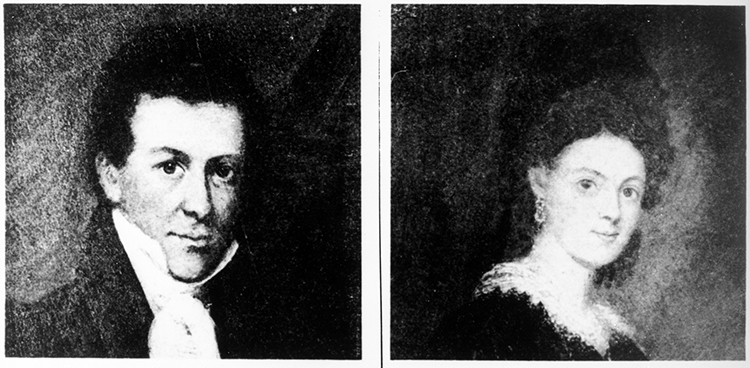23 Aug. 1729–1808
Memucan Hunt, planter-enslaver, state senator, and first treasurer of North Carolina, was born in Virginia, the third son of Ralph and Dinah Anderson Hunt. The ancestors of Ralph Hunt had emigrated from England to Virginia in the seventeenth century. Little is known of Memucan's education and early life. According to tradition, his home from about 1760 was the plantation of Burnside (so named in 1824), where a two-story weatherboarded house was built with interior carved woodwork characteristic of the Classic Revival. It is located near Williamsboro in Vance (then Granville) County.
Hunt's service in the colonial government began at age forty-one. In 1770 he was chosen as sergeant at arms of the North Carolina Assembly, and in 1773 he was elected a representative to the Assembly from Granville and Bute counties. At the March 1774 meeting of the Assembly in New Bern, Governor Josiah Martin and the Council received three bills sent up by Hunt and a Mr. Moore. Of greater significance was Hunt's effort, on behalf of sundry inhabitants of Granville County, to secure passage of a law restraining African-Americans from trading with white people. The Assembly ordered the matter to be tabled.

Approving the rising spirit of colonial rebellion, Hunt and the other freeholders of Granville County resolved in August 1774 to support the people of Wilmington's call for a Provincial Congress. When the Congress convened at New Bern on the twenty-fifth of that month, Hunt, along with Thomas Person, sat for Granville County. At the Second, Third, Fourth, and Fifth Provincial Congresses, Hunt was one of the five delegates from Granville County.
When North Carolina was established as an independent state in 1777, financial problems were paramount. The fiscal responsibilities of Memucan Hunt began with his appointment as the Hillsborough district treasurer, one of six in the state. By 1779 he was also a member of the Committee of Accounts and held office as a senator in the General Assembly. Probably as a result of his leadership, the legislature authorized the issuance of £500,000 in currency, on the faith and credit of the state, to defray military and other expenses. Hunt was one of the three commissioners named to oversee the printing. The next year he filled the same role upon the issuance of an additional £1,240,000.
In November 1784, meeting at New Bern, the General Assembly abolished the several offices of district treasurer and established that of state treasurer, electing Hunt to the post. He took office on 1 Jan. 1785 at a salary of £500 per annum. Due to his having honored—in good faith—some fraudulent claims for payment of compensation for military service, Hunt was involved in both litigation and hearings by the General Assembly in 1786. At the end of that year, though not charged with malfeasance, he was not reelected. Retiring from governmental service, he became a wealthy planter and resided at his home with his family. From 1784 to 1792 he served as a justice of the peace for Granville County.
From Hunt's will, recorded on 23 Feb. 1808, there emerges the picture of a man of considerable substance. This is confirmed by the inventory of Hunt's personal property filed in Granville County Court House in February 1809 after his death. He had enslaved twenty-two people, and owned two horses, four mares, one mare colt, fourteen head of cattle, thirty-three hogs, sows, and shoats, a large quantity of household furniture and utensils, a cotton gin, and various other machines and tools for farming. Including 920 acres left to his wife—for the duration of her life as his widow—Hunt's real property apparently totaled 15,875 acres. Among his holdings were half of a 3,000-acre tract on "Dutch River" and half of a 1,000-acre tract in Tennessee. He had evidently sold 250 acres of land in Wilkes County to Thomas Walsh in 1804. Bonds (debts) due and payable to Hunt's estate included five totaling $384.50, four totaling over £72, one for 8 barrels of corn, and at least one more.
Hunt married Mary ("Polly") Wade, a relative of General Wade Hampton, who survived him; she died in 1825. Among their ten children were Colonel William and Dr. Thomas. Members of the Hunt family are presumed to have been parishioners of St. John's Episcopal Church, Williamsboro, where stands the only colonial church building in the Diocese of North Carolina. Charles Wilson Peale, the famous American artist, did portraits in oil on wood of Hunt and his wife. Photographs of the paintings are extant.